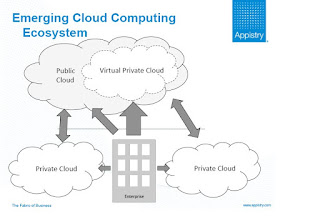Twitter Feed
2018 AT&T Business Summit: Security “in” and “of” the Cloud
While public cloud is undoubtedly an outsized piece of the conversation, news headlines of the latest data breach can make this move a very frightening proposition. The question of how…
My Brush with Royalty: Queen Latifah
Queen Latifah! Hip Hop Icon. Movie Star. Television Star. Fashion Model. Songwriter. Producer. Entrepreneurial Genius!? YES! Dana Elaine Owens, her given name, is co-owner of Flavor Unit Entertainment, a firm that includes…
What’s New in Puppet 5?
Puppet 5 is released and comes with several exciting enhancements and features that promise to make configuration management much more streamlined. This article will take a comprehensive look at these…
5 Reasons Why Ansible is the Best CM Tool Out There?
Amidst volatile markets, dynamic technology shifts, and ever-increasing customer demands, it is imperative for IT organizations to develop flexible, scalable and high-quality applications that exceed expectations and enhance productivity. A…
Machine learning APIs for Google Cloud Platform
Google Cloud Platform (GCP) is considered to be one of the Big 3 cloud platforms among Microsoft Azure and AWS. GCP is widely used cloud solutions supporting AI capabilities to design and…
What Is The Most Important Part of Architecture?
I always find it interesting to hear what people view architecture as. A lot of people think it’s just about the design aspect, where you get to put pen to…
Cloud migration best practice Part 4: Executing the migration
This series has stepped through cloud migration best practices. After providing an overview, we discussed: Classifying business-critical data. Updating organizational IT governance policies. Application screening and cloud workload selection. How to…
Cloud Migration Best Practice Part 3: Application Portfolio Analysis
In part three of this series on cloud migration best practice, I will focus on migrating the application itself. If you haven’t had the opportunity to read our recommendations from part…
Why Use Immutable Storage?
Data has become a global currency, and its value has nowhere to go but up. According to The Economist online, the world’s most valuable resource is no longer oil, but…
CLOUD ACT: What Does That Mean for Your Cloud Storage
When Congress names a law after you, it’s getting serious. That is where we are now with cloud computing. The Clarifying Lawful Overseas Use of Data Act or CLOUD Act (H.R. 4943) is…
Less than 2% of the CIOs in an Infoworld survey said that cloud computing was a priority. The surveyed indicated that server virtualization and server consolidation are their No. 1 and No. 2 priorities. Following these two are cost cutting, application integration, and datacenter consolidation. At the bottom of the list of IT priorities are grid computing, open source software, content management, and cloud computing (called on-demand/utility computing in the survey).
Since cloud computing is all about virtualization and server consolidation these kind of numbers really concern me? Last week during the SOA-R education session, Bob Lozano of Appistry actually talked about how enterprises are integrating public and private clouds today in order to meet virtualization, consolidation and cost cutting goals. His full presentation is available in the SOA-R Interactive Networking Group wiki.

Elastra is also addressing this enerprise need. They are working on a version of Cloud Server for data center VMware environments, their “private clouds.” The company’s pitch is that IT departments need better tools to specify requirements and configure software to run on physical or virtual servers, regardless of whether the underlying systems are on premises or out in the public cloud. See John Foley’s blog on Information Week in The Rise Of Enterprise-Class Cloud Computing.
Sam Charrington is even more definitive in the Open Web Developer’s Journal:
“We’re still relatively early in the cloud computing hype cycle but I strongly believe that in the future, most if not all server-side software applications will be deployed in a cloud-computing-like manner. That is not to say that all applications will be run in one of exactly five global clouds. On the contrary, every enterprise will have one or more ‘clouds’ into which they deploy applications.”
CIO’s should really re-think their views on cloud computing.
Cloud Computing
- CPUcoin Expands CPU/GPU Power Sharing with Cudo Ventures Enterprise Network Partnership
- CPUcoin Expands CPU/GPU Power Sharing with Cudo Ventures Enterprise Network Partnership
- Route1 Announces Q2 2019 Financial Results
- CPUcoin Expands CPU/GPU Power Sharing with Cudo Ventures Enterprise Network Partnership
- ChannelAdvisor to Present at the D.A. Davidson 18th Annual Technology Conference
Cybersecurity
- Route1 Announces Q2 2019 Financial Results
- FIRST US BANCSHARES, INC. DECLARES CASH DIVIDEND
- Business Continuity Management Planning Solution Market is Expected to Grow ~ US$ 1.6 Bn by the end of 2029 - PMR
- Atos delivers Quantum-Learning-as-a-Service to Xofia to enable artificial intelligence solutions
- New Ares IoT Botnet discovered on Android OS based Set-Top Boxes


